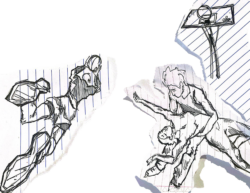People watch sports for a lot of reasons—out of loyalty to a team, to witness acts of transcendent athleticism, because they’re addicted to gambling—but they all essentially boil down to entertainment, and there’s little more entertaining than a game that isn’t decided until its final moments. In that case, this past weekend was a great one for sports fans, with a frighteningly close victory for Georgetown over Rutgers preceding the tightest pair of NFL conference championship games in history.
Those games each produced the requisite last-minute heroes and scapegoats. Otto Porter saved the Hoyas from embarrassment by scoring six unanswered points in the final two minutes. Meanwhile, Baltimore Ravens kicker Billy Cundiff and San Francisco 49ers punt returner Kyle Williams endured death threats after seemingly costing their teams trips to the Super Bowl.
Inevitably, these are the players who capture the headlines and dominate the conversation following the games. However, while Porter, Cundiff, and Williams undoubtedly did change the outcome of their games, apportioning full credit or blame to them is unfair. Despite clichés like “play a complete game” and commentators’ constant reminders that “this is a team game,” more often than not a singular focus takes hold when the clock is winding down. Our tendency to conflate a game’s final moments with its deciding ones makes the players who take on pivotal roles in them seem disproportionately important.
It’s obviously insane for a random person on Twitter to tell Cundiff to “get a rope and chair asap,” but if @trevbrown14 wanted to at least be an equitable crazy person, he should have targeted the whole Ravens team. Yes, the game would have gone to overtime if Cundiff’s 32-yard field goal hadn’t gone wide left, but the Ravens would have won it if Lee Evans could have held onto the ball in the endzone two plays earlier.
It may not feel like it when the final seconds are ticking off the clock, but three points in the first quarter are worth the same as three in the fourth when it comes to the final score. And, of course, that doesn’t take into account all the minor decisions and non-scoring plays that lead up to points being put on the board (or not).
The latter happened more often than the former in the Hoyas’ game on Saturday. Georgetown couldn’t find the basket (they shot 29.3 percent), making the small amount of points chipped in by Porter at the end of the game a lot more meaningful. But that’s a quirk of timing more than anything else.
For example, earlier in the second half, freshman Greg Whittington scored seven straight points in a stretch very similar to Porter’s, bringing the Hoyas back within three after the Scarlet Knights had gained their largest lead of the game. Whittington could have been the hero, but he just as easily could have been the goat, thanks to a couple of missed layups. In the end, the Hoya defense probably deserved the most credit for the win, allowing the team to eke out a victory while scoring just 52 points.
Trying to precisely determine the real deciding factors in any game can be a fool’s errand, but across seemingly all sports there’s a movement toward more accurate indicators than who touched the ball on the final play.
Still, I doubt any of this is consolation for Cundiff or Williams, however, let alone the Ravens and 49ers fans. And I’m pretty sure that any student not in the press room at the Verizon Center on Saturday was too euphoric about escaping such an ugly game with a win to think about who deserved the most credit. Apportioning credit doesn’t change the feeling of a win or loss. But if everyone did it correctly, Billy Cundiff’s family would probably sleep a lot easier.
Is Tim your hero? Let him know at tshine@georgetownvoice.com




